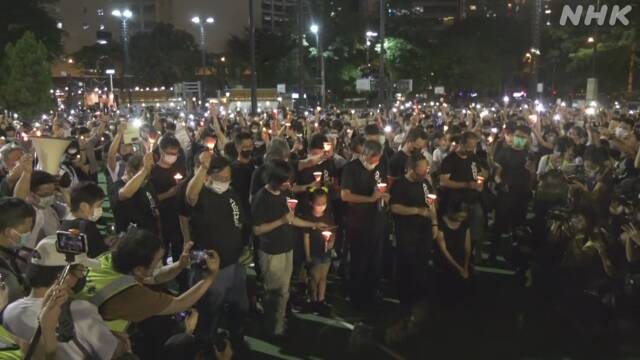31 years after the Tiananmen Incident, many citizens have “freedom” even if the meeting is not permitted Hong Kong June 5, 6:46
k10012458831_202006050642_202006050645.mp4
In Beijing, China, a large-scale rally was held in Hong Kong on the 4th, 31 years after the Tiananmen case where the movement of students seeking democracy was suppressed by force was held in Hong Kong for the purpose of preventing infection with the new coronavirus. Despite this, a large number of people gathered in various places and voiced opposition to the "national security legislation" that China decided to introduce.
In Hong Kong, where freedom of speech and assembly has been recognized under the "one country, two system", a civil group holds a large-scale memorial meeting every year in line with June 4, when the Tiananmen Incident occurred. However, the police did not approve the event because of the prevention of new coronavirus infection.
Nevertheless, the park in the center of Hong Kong Island, which had been the venue for the memorial rally until last year, attracted citizens one after another in the evening, and at the evening, it expanded to a size of several thousand. After gathering candles in the hands of the people and offering silence to the victims of the Tiananmen Incident, they sought to "fight for freedom."
In addition, there is a possibility that the rally may not be possible from next year onwards due to the "national security legislation" that cracks down on the anti-government movement in Hong Kong that China decided to introduce, and he is opposition to the introduction of the legislation. It was
A woman in her 50s who participated said, "This meeting is like a once-a-year visit to my grave. We have the freedom to meet and I don't understand why it is robbed."
On the night of the 4th, people gathering for freedom and democratization of Hong Kong gathered in various places such as downtown and residential areas in the suburbs, and then some participants clashed with police and several people were detained. That is.
Online meetings
At the time of the Tiananmen Incident, former student leaders who left China after seeking democracy opened an online meeting due to the restrictions on meetings in each country due to the spread of the new coronavirus. It was
This was a call by Mr. Wang Tan, one of the student leaders of the time and now living in the United States, with over 200 people from all over the world participating.
The rally started late last night in Japan time, and after offering silence to the victims of the 4th case, former student leaders commented on their thoughts when they called for democratization.
Among them, Mr. Uruqaishi, who is currently active in Taiwan and other countries, said, “We wanted freedom of speech and democracy in China. It has not been realized for 31 years and in Hong Kong, the new coronavirus is an excuse. We must continue to work to win freedom, even though we are not allowed to mourn."
In addition, Mr. Huang Yong, a senior executive of a democratic organization in Hong Kong, also sent a video message, ``I do not know what the future of Hong Kong will be in the future, but we do not give up just like the Chinese students 31 years ago I would like to continue,” and emphasized the stance of calling for the withdrawal of the “national security legislation” that China decided to introduce.
Memorial meeting in Taiwan
A rally was held in Taiwan to commemorate the victims of the Tiananmen Incident. The rally was held in a square in central Taipei at the call of people from Hong Kong and now living in Taiwan, where many people, especially young people, gathered and lit a candle and offered silence.
In addition, the organizer said, "I am sorry that I can not work with my friends who are doing demonstrations in Hong Kong together, but we do not give up either," said the Hong Kong people who are seeking freedom and democratization. Showed solidarity.
Then, he said, "Regain Hong Kong. It's a revolution of the times." He called up Suprechhol and opposed opposition to the "national security legislation" that cracked down on China's anti-governmental move.

